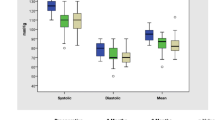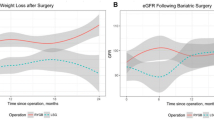Abstract
Background
Obesity is an independent risk factor for hypertension and chronic kidney disease. During the first months after bariatric surgery, an improvement of sodium excretion has been described. The aim of this work was to study the influence of bariatric surgery on sodium excretion at more than a year after the intervention.
Methods
Patients who have undergone Roux-en-Y gastric bypass (RYGB) and who had collected a 24-h urine sample before surgery more than 12 months ago were asked to participate. A second 24-h urine sample was collected. Blood pressure and weight were measured. The difference in sodium excretion before and after surgery was calculated, and the relationship with blood pressure and weight loss was investigated.
Results
We included 33 patients; the median follow-up time was 21 months (range 14–41). Sodium excretion was high before surgery (median 195 mmol/day, IQR range 167–247) and decreased by 18 % after surgery (median 160 mmol/day, IQR range 118–205, p = 0.015), while there were significant improvements in body weight (% EWL 80.9 ± 21.8), systolic blood pressure (126 to 120 mmHg, p = 0.02), and diastolic blood pressure (84 to 77 mmHg, p = 0.002), even with a reduced number of antihypertensive drugs.
Conclusions
After RYGB and considerable weight loss, sodium excretion remains high in the longer term. The profound improvement in blood pressure cannot be explained by reductions in sodium excretion after RYGB.


Similar content being viewed by others
References
Garrett JR, McNolty LA. Bariatric surgery and the social character of the obesity epidemic. Am J Bioeth. 2010;10:20–2.
Chen J, Gu D, Huang J, et al. Metabolic syndrome and salt sensitivity of blood pressure in non-diabetic people in China: a dietary intervention study. Lancet. 2009;373:829–35.
Laville M. Renal consequences of obesity. Nephrol Ther. 2011;7:80–5.
Hall JE, Henegar JR, Dwyer TM, et al. Is obesity a major cause of chronic kidney disease? Adv Ren Replace Ther. 2004;11:41–54.
Serra A, Romero R, Lopez D, et al. Renal injury in the extremely obese patients with normal renal function. Kidney Int. 2008;73:947–55.
Wu Y, Liu Z, Xiang Z, et al. Obesity-related glomerulopathy: insights from gene expression profiles of the glomeruli derived from renal biopsy samples. Endocrinology. 2006;147:44–50.
Chagnac A, Weinstein T, Korzets A, et al. Glomerular hemodynamics in severe obesity. Am J Physiol Ren Physiol. 2000;278:F817–22.
Chagnac A, Herman M, Zingerman B, et al. Obesity-induced glomerular hyperfiltration: its involvement in the pathogenesis of tubular sodium reabsorption. Nephrol Dial Transplant. 2008;23:3946–52.
Cubeddu LX, Hoffmann IS, Aponte LM, et al. Role of salt sensitivity, blood pressure, and hyperinsulinemia in determining high upper normal levels of urinary albumin excretion in a healthy adult population. Am J Hypertens. 2003;16:343–9.
Ritz E, Koleganova N, Piecha G. Is there an obesity–metabolic syndrome related glomerulopathy? Curr Opin Nephrol Hypertens. 2011;20:44–9.
Konta T, Hao Z, Abiko H, et al. Prevalence and risk factor analysis of microalbuminuria in Japanese general population: the Takahata study. Kidney Int. 2006;70:751–6.
Verhave JC, Hillege HL, Burgerhof JG, et al. Sodium intake affects urinary albumin excretion especially in overweight subjects. J Int Med. 2004;256:324–30.
Fujita T, Ando K. Role of electrolytes in the development and maintenance of hypertension. Nihon Naibunpi Gakkai Zasshi. 1994;70:423–30.
Andersson OK, Fagerberg B, Hedner T. Importance of dietary salt in the hemodynamic adjustment to weight reduction in obese hypertensive men. Hypertension. 1984;6:814–9.
Kumanyika SK, Cook NR, Cutler JA, et al. Sodium reduction for hypertension prevention in overweight adults: further results from the Trials of Hypertension Prevention Phase II. J Hum Hypertens. 2005;19:33–45.
Fagerberg B, Andersson OK, Isaksson B, et al. Blood pressure control during weight reduction in obese hypertensive men: separate effects of sodium and energy restriction. Br Med J (Clin Res Ed). 1984;288:11–4.
Rissanen A, Pietinen P, Siljamaki-Ojansuu U, et al. Treatment of hypertension in obese patients: efficacy and feasibility of weight and salt reduction programs. Acta Med Scand. 1985;218:149–56.
van de Borne P, Watrin I, Bouquegneau M, et al. Ambulatory blood pressure and neuroendocrine control after diet-assisted gastric restrictive surgery. J Hypertens. 2000;18:301–6.
Kumar R, Lieske JC, Collazo-Clavell ML, et al. Fat malabsorption and increased intestinal oxalate absorption are common after Roux-en-Y gastric bypass surgery. Surgery. 2011;149:654–61.
Davis BR, Oberman A, Blaufox MD, et al. Lack of effectiveness of a low-sodium/high-potassium diet in reducing antihypertensive medication requirements in overweight persons with mild hypertension. TAIM Research Group. Trial of Antihypertensive Interventions and Management. Am J Hypertens. 1994;7:926–32.
Hall JE. The kidney, hypertension, and obesity. Hypertension. 2003;41:625–33.
Brown IJ, Tzoulaki I, Candeias V, et al. Salt intakes around the world: implications for public health. Int J Epidemiol. 2009;38:791–813.
Michels WM, Grootendorst DC, Verduijn M, et al. Performance of the Cockcroft–Gault, MDRD, and new CKD-EPI formulas in relation to GFR, age, and body size. Clin J Am Soc Nephrol. 2010;5:1003–9.
Pekkarinen T, Takala I, Mustajoki P. Weight loss with very-low-calorie diet and cardiovascular risk factors in moderately obese women: one-year follow-up study including ambulatory blood pressure monitoring. Int J Obes Relat Metab Disord. 1998;22:661–6.
Caroline van den Hooven, Heidi Fransen, Eugene Jansen, Marga Ocke: 24-uurs urine-excretie van natrium, 2007 (Dutch). Retrieved from: www.rivm.nl.
Powell CR, Stoller ML, Schwartz BF, et al. Impact of body weight on urinary electrolytes in urinary stone formers. Urology. 2000;55:825–30.
Taylor EN, Curhan GC. Body size and 24-hour urine composition. Am J Kidney Dis. 2006;48:905–15.
Venezia A, Barba G, Russo O, et al. Dietary sodium intake in a sample of adult male population in southern Italy: results of the Olivetti Heart Study. Eur J Clin Nutr. 2010;64:518–24.
Zhang J, Temme EH, Sasaki S, et al. Under- and overreporting of energy intake using urinary cations as biomarkers: relation to body mass index. Am J Epidemiol. 2000;152:453–62.
Heber D, Greenway FL, Kaplan LM, et al. Endocrine and nutritional management of the post-bariatric surgery patient: an Endocrine Society Clinical Practice Guideline. J Clin Endocrinol Metab. 2010;95:4823–43.
Burge JC, Schaumburg JZ, Choban PS, et al. Changes in patients' taste acuity after Roux-en-Y gastric bypass for clinically severe obesity. J Am Diet Assoc. 1995;95:666–70.
Aoi W, Ueda Y, Tanigawa M. Effect of weight loss on the reduction of blood pressure in obesity hypertension—hyperinsulinemia and renal sodium retention. Nihon Jinzo Gakkai Shi. 1992;34:1177–82.
Eliahou HE, Erdberg A, Blau A. Energy restriction or salt restriction in the treatment of overweight hypertension. Which one? A point of view. Clin Exp Hypertens A. 1990;12:795–802.
Navarro-Diaz M, Serra A, Romero R, et al. Effect of drastic weight loss after bariatric surgery on renal parameters in extremely obese patients: long-term follow-up. J Am Soc Nephrol. 2006;17:S213–7.
Ohashi H, Oda H, Ohno M, et al. Weight reduction improves high blood pressure and microalbuminuria in hypertensive patients with obesity. Nihon Jinzo Gakkai Shi. 2001;43:333–9.
Serpa NA, Bianco Rossi FM, Dal Moro AR, et al. Effect of weight loss after Roux-en-Y gastric bypass, on renal function and blood pressure in morbidly obese patients. J Nephrol. 2009;22:637–46.
Afshinnia F, Wilt TJ, Duval S, et al. Weight loss and proteinuria: systematic review of clinical trials and comparative cohorts. Nephrol Dial Transplant. 2010;25:1173–83.
Agrawal V, Krause KR, Chengelis DL, et al. Relation between degree of weight loss after bariatric surgery and reduction in albuminuria and C-reactive protein. Surg Obes Relat Dis. 2009;5:20–6.
Chagnac A, Weinstein T, Herman M, et al. The effects of weight loss on renal function in patients with severe obesity. J Am Soc Nephrol. 2003;14:1480–6.
Serra A, Granada ML, Romero R, et al. The effect of bariatric surgery on adipocytokines, renal parameters and other cardiovascular risk factors in severe and very severe obesity: 1-year follow-up. Clin Nutr. 2006;25:400–8.
Uzu T, Sakaguchi M, Yokomaku Y, et al. Effects of high sodium intake and diuretics on the circadian rhythm of blood pressure in type 2 diabetic patients treated with an angiotensin II receptor blocker. Clin Exp Nephrol. 2009;13:300–6.
Conflict of Interest
The authors certify that there is no conflict of interest with any financial organization regarding the material discussed in the manuscript.
Author information
Authors and Affiliations
Corresponding author
Rights and permissions
About this article
Cite this article
Celik, F., Ahdi, M., Meesters, E.W. et al. The Longer-Term Effects of Roux-en-Y Gastric Bypass Surgery on Sodium Excretion. OBES SURG 23, 358–364 (2013). https://doi.org/10.1007/s11695-012-0764-3
Published:
Issue Date:
DOI: https://doi.org/10.1007/s11695-012-0764-3




